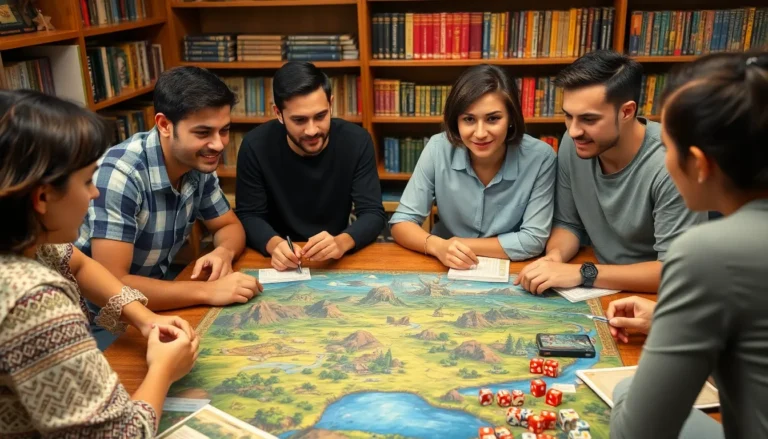In the world of sports games, mastering your skills can feel like trying to juggle flaming torches while riding a unicycle. Enter the skill tree—a magical realm where players can level up their abilities faster than a cheetah on roller skates. It’s not just a fancy chart; it’s the secret sauce that turns average Joes into sports legends, allowing them to unlock new moves and strategies that can leave opponents scratching their heads.
Imagine diving into a game where every decision you make shapes your journey. Should they enhance their shooting accuracy or beef up their defense? With a well-structured skill tree, players can navigate their growth like a pro, making choices that could lead to glory—or a spectacular faceplant. This article dives into the fascinating world of sports games skill trees, revealing how they can elevate gameplay and transform players into champions.
Table of Contents
ToggleOverview of Sports Games Skill Tree
Skill trees in sports games serve as a foundational element for character progression. Players encounter various pathways that allow them to develop and customize their abilities. Each branch in the skill tree represents a specific skill, such as shooting, passing, or defensive techniques.
Choices define how a player improves their character. For example, focusing on shooting accuracy enhances a player’s ability to score goals, while investing in defense increases resilience against opponents. Players weigh these choices carefully, knowing each decision impacts their overall performance during gameplay.
Unlocking new moves and strategies depends heavily on the skill tree’s structure. As players advance, they can acquire unique abilities, which often leads to more dynamic gameplay. Progression becomes an engaging element, with players wanting to explore every option available.
Time investment in training correlates directly with improvement in skills. Regular practice and decision-making enhance their understanding of the game mechanics. Developing skills efficiently remains critical for achieving competitive advantages.
To summarize, the sports games skill tree offers a structured approach to skill enhancement. Players reap the rewards of their choices through gameplay experiences, leading to greater success on the field. Emphasizing personal strengths through the skill tree adds depth to the gaming experience.
Importance of Skill Trees in Sports Games

Skill trees play a vital role in enhancing the overall experience in sports games. They provide players with clear paths to develop specific abilities. Engaging with skill trees fosters a sense of progression, encouraging players to invest time in their development. Players enjoy the satisfaction that comes from unlocking new skills and improving their overall gameplay.
Enhancing Player Experience
Players appreciate the layered complexity skill trees introduce into gameplay. By offering options, they empower players to tailor their characters to fit individual play styles. A diversified skill tree promotes exploration, pushing players to experiment with different skills. Engaging with these trees enhances immersion as players witness their character’s growth. Satisfaction arises when players see the direct outcomes of their choices reflected in game performance.
Strategic Development
Strategic development becomes essential as players navigate through skill trees. They face decisions that significantly affect their gameplay approach. Each branch of the skill tree represents unique strategic choices, leading to various gameplay outcomes. Evaluating options, players balance between improving offense and defense based on their preferred strategies. This decision-making aspect elevates the gameplay experience, providing depth and encouraging thoughtful planning. Prioritizing skills can offer competitive advantages in matches, highlighting the importance of an informed strategy.
Types of Skill Trees in Sports Games
Skill trees come in various forms, each influencing gameplay uniquely. Understanding these types helps players make informed choices.
Linear Skill Trees
Linear skill trees offer a straightforward path for players to follow. Progression occurs in a sequential manner, requiring players to unlock skills in a preset order. Each new skill builds on the previous one, ensuring a clear sense of advancement. For example, a player might enhance their shooting ability first before accessing advanced techniques. Many players appreciate the simplicity of linear trees, allowing them to develop core skills before branching out. This structured progression fosters confidence, as players can visibly track their improvements over time.
Branching Skill Trees
Branching skill trees present a more complex system for skill development. These trees allow players to choose different paths based on their preferred playstyle or strategy. Players decide whether to invest in offensive skills, defensive capabilities, or a mix of both, creating a personalized experience. For instance, one branch might focus on enhancing speed and agility, while another emphasizes strength and defense. Flexibility becomes a key element, as players can adapt their skills to counter opponents’ strategies. This strategic choice adds depth, encouraging experimentation and engagement with diverse skills throughout the game.
Examples of Popular Sports Games with Skill Trees
Numerous sports games incorporate skill trees, enhancing player experiences by providing opportunities for growth and specialization. Below are examples of well-known titles that feature this engaging system.
FIFA Series
The FIFA series integrates a skill tree system within its Career Mode. Players can develop their characters by earning skill points through gameplay. Investing points into attributes such as dribbling, passing, and shooting unlocks special moves. Players can choose to enhance offensive skills or bolster defensive capabilities depending on their strategies. This system empowers users to shape their player’s progression uniquely, focusing on personal playstyles.
NBA 2K Series
The NBA 2K series employs an extensive skill tree within MyCareer mode. Gamers can allocate skill points to enhance different aspects of their player’s abilities. Prioritizing attributes, such as shooting accuracy or defensive skills, facilitates a tailored approach to gameplay. The skill tree expands with progression, offering enhanced capabilities like signature moves and specialized attributes. Each decision impacts the overall performance on the court, thereby encouraging strategic planning as players navigate through their development journey.
Future Trends in Sports Games Skill Trees
Emerging trends in sports games skill trees emphasize customization and adaptability. Players increasingly demand more control over their characters, leading to the development of dynamic skill trees that evolve based on player performance and choices. For instance, some games are likely to implement machine learning algorithms to assess players’ adaptiveness and suggest skill upgrades accordingly.
Integration of real-time data into skill tree mechanics also becomes a key trend. Gamers will benefit from immersive experiences as analytics track their in-game performance, prompting tailored skill recommendations. This personalization enhances engagement and ensures that players can evolve their strategies to meet specific challenges within their games.
Cross-game experiences are also on the horizon. As online gaming thrives, skills developed in one game may transfer to another, fostering a community that shares knowledge and team strategies. This interconnected approach not only boosts skill transfer but also encourages players to master various facets of gameplay.
Accessibility remains a priority in future skill tree designs. Developers focus on creating user-friendly interfaces that allow gamers of all skill levels to navigate enhancements easily. Streamlined upgrades offer a less daunting experience for newcomers, inviting broader participation.
Moreover, the aesthetic presentation of skill trees is expected to evolve. Visual designs will likely incorporate intuitive graphics that highlight character growth while making the progression journey enjoyable and visually satisfying. By enhancing the overall user interface, players can immerse themselves further in their gaming experience.
Future iterations of sports games skill trees promise greater engagement and individualized gameplay. As technology continues to advance, these adaptations ensure that players harness their full potential while enjoying interactive sports experiences.
The evolution of skill trees in sports games marks a significant shift in player engagement and strategy. By offering pathways for skill enhancement and personalized gameplay, these systems empower players to take charge of their development. The balance between offense and defense decisions fosters a deeper connection to the game, making each choice impactful.
As the gaming landscape continues to evolve, the integration of dynamic and customizable skill trees will likely enhance player experiences even further. The focus on accessibility and user-friendly designs ensures that a broader audience can enjoy the intricacies of skill development. With these advancements, players can look forward to more immersive and rewarding sports gaming experiences.






